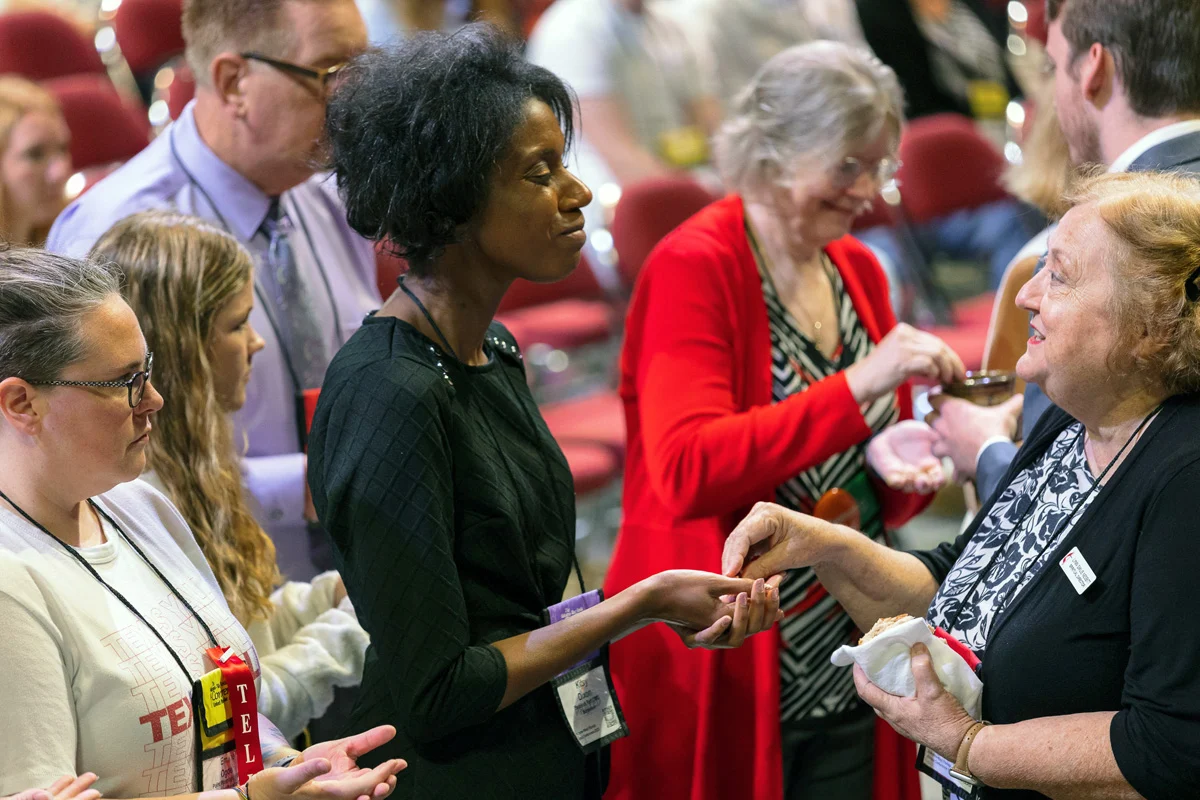I’d like to take a moment to reach out to you, as our pastors, staff, and lay leadership at Riverchase UMC, to express my thoughts about Sunday’s “re-vote” in the sanctuary at 4:30 pm.
I’m worried for the future of our church if we keep at this “voting over and over” thing.
I’m heavy-hearted about what lies ahead for us.
I know you’ve likely received a lot of emails, but that just means that we have engaged church members.
The following are some key points that I’d like to reinforce as you all consider a discernment vote.
Discernment is not a Clean and Easy Process and Takes Time
Let’s first revisit what happened at Vestavia Hills UMC. The entire discernment process at VHUMC created sadness and division, and, I’ll gladly counter what was stated at our January 8th informational meeting by a church member – it was nothing to model anything after if you want to align a church toward a thriving, loving future.
The outcome there was so bad that former, beloved ministers who had built the body of the church actually came and removed their official ministerial photos of themselves and their families from the walls of the church. For a period of time, there were just nails in the walls of the church where the photos used to be.
People made yard signs stating their hopes that VHUMC left the United Methodist Church behind.
Stickers were handed out in the narthex as people came in advocating for withdrawal from the United Methodist Church.
Their pastor had to recuse himself from being a co-chair of the bishop’s conference-wide “NAC3” team tasked with helping the conference and its churches find the best way forward; from the sound of it, he was getting too much pressure from his church, and the voices there who wanted to disaffiliate.
It was really a mess.
The discernment process at our church would dictate what pastors, staff, and laity had to focus on for the next three to six months. Sure, it wouldn’t take up all the time, but it would be mentally consuming.
Church councils (aka “Boards of Stewards”) should be focused on setting direction and strategies for initiatives that the pastors and staff can find ways to execute on. Church councils are responsible for collectively agreeing upon opportunities to bring more to know Christ, setting a vision for the church, and knowing where the proverbial puck is going to be so that we can start skating to it rather than reacting to where it is now.
You see, discernment at a church of 50 people is a different undertaking than one with almost 3,000. Small churches can easily determine who they are. Larger churches are more complex and can get messy.
I feel that our discernment – specifically as a larger church with varied perspectives – could lead us down a path of unhealable fracturing.
Trinity UMC was probably not going to disaffiliate even after going through a well-led discernment process simply because of the makeup of their congregation. It didn’t surprise me that a disaffiliation vote with the congregation never happened.
Canterbury UMC seems to be using some of the same discernment elements from Brentwood UMC (Tennessee) that worked for Trinity; my gut tells me that Canterbury will remain in the United Methodist Church from anecdotal feedback I’ve received.
While this all sounds great in theory, the process can really have some detrimental effects on a church that doesn’t have all of its members aligned and pointing in a direction of acceptance of one another.
Help Our Senior Pastor Keep Us Together as United Methodists
It may not be something he’ll ever toot his own horn about, so I’ll do it for him.
Our Bishop, Debra Wallace-Padgett, in late December added Riverchase UMC’s own Tony Johnson to the North Alabama Conference’s “NAC3” team I referenced earlier.
This team, made up of pastors, laity, and administration from across the North Alabama Conference and led by the Bishop herself, has the following values that they use to guide them as they meet each month:
- Belief in Sanctification;
- Focus on creating transformative environments for disciple-making in the many existing cultures of North Alabama;
- Clarity and accuracy in information sharing; and
- Shared vision formed through respect for differing perspectives.
– Message from the NAC3 Team: Season of reflection and renewal, January 12, 2023, UMC North Alabama Conference website
Reread bullet #4 – a “shared vision”.
Additionally, in a post from November 2022 titled “Message from NAC3 Team: Values that Guide our Work”, one of the key values of the team is that “we believe we are better together“.
This team is trying to figure out how we United Methodists in the North Alabama Conference can continue to do God’s work together as we all continue to hold the diverse beliefs that we’ve held as Methodists for over 200 years.
As I mentioned earlier, Vestavia Hills UMC’s pastor ended up taking himself off of this team because there was too much friction between his church and a key tenet of the NAC3 team – determining how we stay together amidst various differences.
His church’s loudest voices didn’t agree with “we believe we are better together”.
So does our Board of Stewards want to put our senior pastor in a position to be swimming upstream against the currents of work being done with our Bishop?
Is dealing with discernment healthy for his work in leading our church?
We Already Know Disaffiliation Would Cost…. A Lot
Our approximate disaffiliation amount is in the ballpark of $787,000.
This is a figure we know now, before discerning anything. Sure, it could give or take a little based on the timing of disaffiliation.
But entering a discernment period with this info in hand would communicate that we as a church are at least somewhat comfortable with the thought of putting $787,000 toward dividing our church.
Not feeding those in need or lifting up those who are marginalized.
Not housing those who are without refuge.
Not creating opportunities for more outreach so people are brought into the embracing arms of a Christ who promises eternity with Him if we simply choose to open our hearts and follow.
Would Jesus be proud of us for this?
And if someone decides to raise those funds within the congregation to finance disaffiliation, what does that say about our church’s desire to find every way to help those in need? Will we be proud of the fact that we’d have been sitting on that much money all of this time and decide that this is the thing we’re motivated to use it on?
That $700k+ amount is just to leave the denomination. That doesn’t take into account the millions of dollars in debt for buildings that we still have.
Logistically, this would be a massive amount of interest that a congregation would be burdened with, as the new debt would be refinanced at today’s higher rates vs when our debt was originally financed.
And? What bank would want to lend millions of dollars to a fracturing congregation whose income stream was uncertain at best?
We don’t need to be discerning anything with these figures in hand – it’s a known, looming obstacle, and we could do so much more with this money if it’s somehow already floating around out there.
And Is This All About a Building?
We need to stop the un-Christian dialogue around disaffiliation as some battle for a building and real estate. This is a more complex issue than just one of “facilities”.
I know that people think that United Methodist congregations have until December 31st, 2023 to disaffiliate from the UMC.
But that’s not really accurate.
In a post last fall from the aforementioned NAC3 team, they committed to a key element that may allay fears about our “time running out”:
2. We will seek paths for gracious exit beyond General Conference 2024.
Currently, some churches feel an urgency to pursue disaffiliation under Book of Discipline ¶2553. Out of our desire to promote intentional Spirit-led discernment, the leadership of the North Alabama Conference is committed to be creative, fair and non-punitive in negotiating with departing congregations, after ¶2553 expires in December 2023.The Conference Board of Trustees, has a long history of being gracious and fair with departing congregations. The NAC3 team will work with district and conference leadership and the Conference Board of Trustees to ensure ongoing fair and gracious negotiations regarding the disposition of property of closed churches. Such commitments would not end with our current bishop’s tenure, regardless of when that may be.
– Message from NAC3 Team – A Vision for Our Future, August 25, 2022, UMC North Alabama Conference website
The South Carolina Conference, for example, recently established a process to allow disaffiliation that wasn’t related to Paragraph 2553 of the Book of Discipline.
So, unless all of this is really about getting a building, we don’t have to worry about the North Alabama Conference keeping any church in the UMC against its will after 12/31/2023.
Don’t Become Victims of a False Fear of the Future
I can’t tell you how many silly fallacies and falsehoods I’ve heard being spread about what the United Methodist Church will look like in the future. They’re likely coming from a few, organized sources, but that’s for another day.
Talk of the UMC not recognizing the triune God, not stating creeds that we state today, not using “brothers and sisters” in the phrase “brothers and sisters in Christ” anymore, and of course the most outlandish of them all being that the Bible won’t be considered as the authoritative text of God.
It’s all rubbish, and it’s sad that it’s being propagated by fellow Christians.
If you look at our society today, we too often fall victim to rage over issues that aren’t even “issues” and cause people to push for rules and actions based on grand, yet phantom, impacts.
Why? Because people getting us enraged about something makes our human nature want to react. We end up raging over issues that make us buttress our defenses and take action against something that isn’t even going to affect us in the near term.
Ah, but doing so makes it seem as though we’ve squashed an enemy and that we “won” against a force that is going to disrupt life as we know it.
These rumors about changes to our denominational practices are no different. They’re “hot button” triggers with no basis in reality. They strike at any exposed fears of change.
Do not let fears, rumors, and disinformation drive a decision that will have long-term repercussions for our church, regardless of what beliefs our members may currently hold.
The Book of Discipline Isn’t Likely to Change Right Away Anyway
What about all of the changes that some feel will immediately happen at General Conference 2024 and changing the Book of Discipline language?
Yeah, that’s not likely to happen either right away.
But that doesn’t mean that people won’t be trying to get changes made; they should if we want our church to have a future.
It’s a longer story to explain, but there are many UMC delegates across the world who vote on legislation for our churches. And if you look at the actual data, only a small percentage of churches in total have decided to disaffiliate from the UMC. That means that there are still a lot of voices who may not want to modify the Book of Discipline text and those folks are not all disappearing overnight at the end of 2023.
Proposed changes to the Book of Discipline could realistically fail several General Conferences in a row.
We’re talking about potentially five to seven years or more of General Conferences. It takes a while to steer a ship our size in a different direction.
Couple those thoughts with the fact that there is another huge restructuring of the UMC and its jurisdictions coming up for discussion – included in UMC legislation known as the “Christmas Covenant” – it’s easy to see why it make take some time before any movement happens at all with the Book of Discipline language on LGBTQ+ marriages and clergy.
What’s the Harm Of Doing This? Plenty.
For those who want to say, “what’s the harm of just going through the process,” I say to you: reach out to anyone who has left Vestavia Hills UMC and ask them if discernment was a healthy process for them. Ask them if they benefitted from hearing other perspectives. Ask them if they felt like it was a great experience.
Just this past week, I spoke to a woman who is a Riverchase resident and was a Vestavia Hills UMC member before their disaffiliation. She told me that they were considering Riverchase UMC as their new church home…. and then they found out we were considering entering discernment.
Her family decided instead to start attending Trinity UMC.
It will be hard for us to get another chance to convince her and her family again that Riverchase UMC is a great place to make their spiritual home.
Vestavia Hills UMC had its share of tension and conflict before discernment due to a variety of reasons. That tension is still here at Riverchase UMC, regardless of the picture we’d like to paint of ourselves with a new pastor, the covid-19 pandemic coming to an end, and more people returning to in-person worship.
I’m Not Sure We’re Healthy Enough for This Surgery
We’re still not a church in a healthy state. We even have a bit of notoriety in pastoral circles around the state because of the strife of the last few years.
Twenty-three years ago, my grandmother, who was saddled with several underlying health issues, wanted to be more mobile as she neared the end of her life. She had a nagging hip joint that had deteriorated and made her largely immobile.
She knew that hip surgery was risky because she had so many other health issues that could complicate keeping her vitals stable through surgery. She was cautioned about the risks. But she still thought it was best for her quality of life to proceed.
I talked to her on the phone on the morning of her surgery before she got wheeled into the operating room.
Implying that we’d talk again after surgery, she closed the call with these words that now seem bigger than I realized in that moment:
I’ll see you on the other side.
She passed away in surgery.
She was not healthy enough to put more stress on her already fragile system. Sure, the surgery could have also been successful and life could have been great for her afterward. But these decisions always look great when everything turns out fine.
Do we want to go into this “surgery” in our church’s current state of health?
The Takeaway
Your job as lay leaders is weighty and yet you’re giving your time for our church and something you believe in. For that, I thank you.
I pray that each of you will listen out for God’s guidance in your prayers.
You indeed do have the future of our church in your hands.
I don’t say that lightly or feel that’s hyperbole.
What you decide as a collective group on Sunday afternoon will shape the way our church is perceived in the community and the legacy it will leave in the Riverchase community for years to come.
The first time you voted on this in October, your actions put some hard days in the rear-view mirror and some healing started.
I hope you’ll lead our church to a place where we can all feel hopeful for our future.
No matter what happens, the grace of God will always be there for all of us and we should celebrate and make a joyful noise — together — for that.
I’ll see you on the other side.






